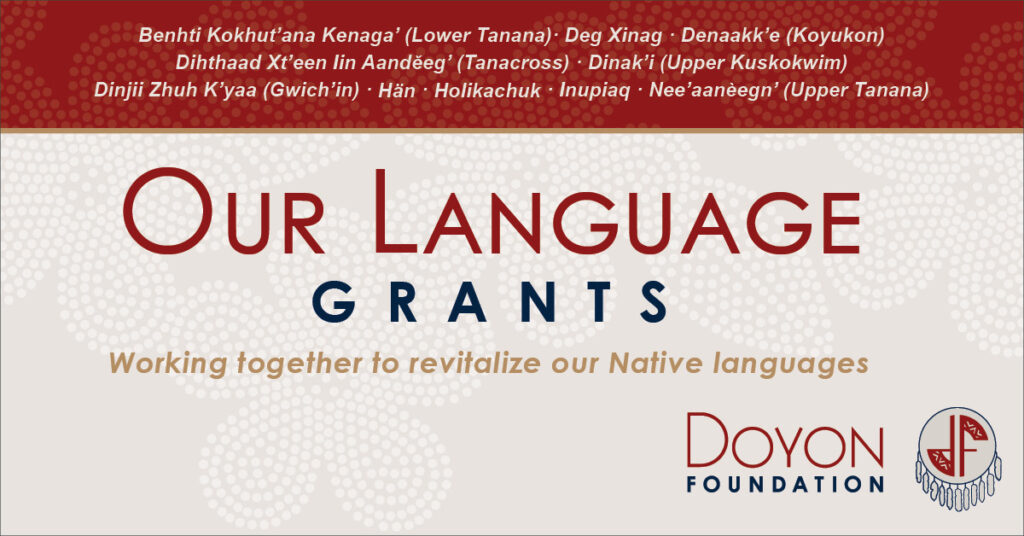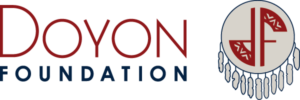
Doyon Foundation has selected 10 organizations to receive Our Language grant funding for language revitalization projects across the Doyon region this year. A total of $50,000 will be awarded to the 2022 recipients, including Doyon region tribal governments, tribal councils and communities; nonprofit Alaska Native organizations, societies and community groups; and Alaska Native cultural, educational and recreational organizations.
The 2022 Our Language grant recipients include:
Athabascan Fiddlers Association. This project will work to preserve spoken examples of Alaska Native languages for use in current and future efforts. A project archivist will extract 1,000 audio files from existing “Word of the Day” and “Phrase of the Day” programs, and audio files to be posted on the KRFF Voice of Denali website with a goal to revitalize them throughout Interior Alaska.
Denakkanaaga. This project will create a language-learning game in three Alaska Native languages, with a goal to foster understanding and respect for Native languages in non-Native community members by sharing a simple language-learning activity. The project will represent Native language with an interesting, professional-quality game that is broadly distributed.
Dot Lake. This project will create educational material for children. The material will be a combination of photos with English words and translations in Athabascan. Workbooks will be distributed to children in the villages of Dot Lake and Healy Lake.
Iḷisaqativut. This project will develop grammar resources for learning Iñupiaq. Resources will include dialogues and vocabulary recordings for language learners, and will be hosted on tusaalanga.ca. The website resources will be the impetus for development of language-learning textbooks in the future.
Koyukuk. Through this project, four Koyukon Athabascan first language Elders will be recorded sharing in the language about their knowledge and experiences regarding the traditional Athabascan values that were adopted during the 1985 Denakkanaga Elders Conference. A curriculum guide for school-age children will then be developed based on the knowledge and experiences shared by the Elders.
Minto. In this project, at least 10 youth will participate in hands-on learning of the Benhti Kokhut’ana Kenaga’ (Lower Tanana) language at a multi-day summer camp. Participants will acquire knowledge of traditional practices, and will keep journals to document their learning.
Morris Thompson Cultural Center. The project will create contextual language-learning activities for three of the Doyon region’s ancestral and critically endangered languages. Efforts include creating a vocabulary-building activity based on the Morris Thompson Center interpretive exhibits, and made available in Denaakk’e (Koyukon), Dinjii Zhuh K’yaa (Gwich’in), and Benhti Kokhut’ana Kenaga’ (Lower Tanana).
Nulato Tribal Council. The project will create engaging, culturally relevant videos of songs traditionally sung at local ceremonies. The goal is to have all regular attendees of council-run cultural events and ceremonies, from young children to Elders, capable of participating in the traditional song practices by 2024.
Tanacross School. Language teacher and Tanacross Learners’ Dictionary author, Irene Arnold, will teach a one-month language camp. Participants will learn Athabascan alphabet sounds, words to speak about self, and to speak in full sentences.
Tetlin. A total of 15 students will participate in a cultural language camp in Last Tetlin. Youth will learn Native values in Athabascan, and learn to carry a conversation with each other. Elders will also teach traditional songs and their meanings.
Through the Our Language grant program, the Foundation and grant recipients are working together to revitalize the 10 ancestral languages of the Doyon region, which are all severely to critically endangered. These languages are Benhti Kokhut’ana Kenaga’ (Lower Tanana), Deg Xinag, Denaakk’e (Koyukon), Dihthaad Xt’een Iin Aanděeg’ (Tanacross), Dinak’i (Upper Kuskokwim), Dinjii Zhuh K’yaa (Gwich’in), Hän, Holikachuk, Inupiaq and Nee’aanèegn’ (Upper Tanana).
Doyon, Limited established the language grant program in 2012, and the Doyon Foundation language revitalization program now manages the Our Language grants. Each year, the Foundation awards grants to support a wide variety of community-based language revitalization projects.
For additional information, visit doyonfoundation.com/grants or contact Doyon Foundation’s language revitalization program at haytona@doyon.com or 907.459.2162.
